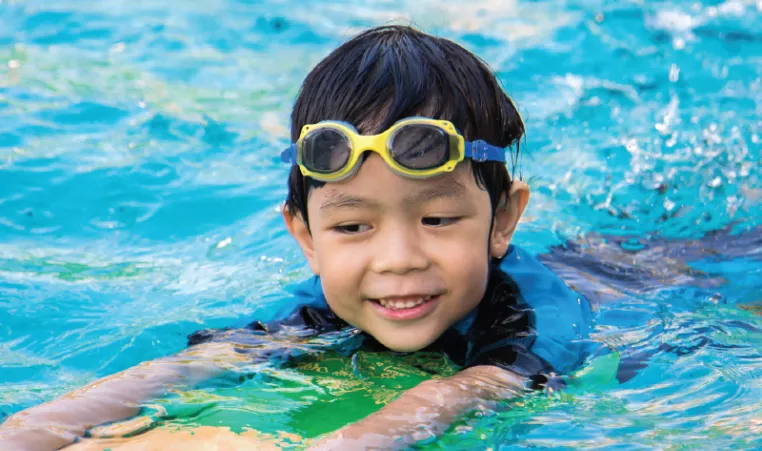
Spending a summer afternoon in the water can be one of the most relaxing and fun things you can do. Whether you’re swimming in a YMCA pool or spending the day with family on the lake, It’s important to take proper measures around water to keep you and your family safe. We’ve put together some swimming safety tips to keep in mind as you plan your water activities.
Swimming Lessons
Everyone in the family should learn how to swim. If they haven’t or have limited skills, sign up for lessons with a certified swim instructor, such as those offered at the YMCA. YMCA swimming lessons teach swimming skills, stroke technique, and water safety skills such as floating, treading water and safety entering and exiting the pool.
Always be Prepared
A matter of seconds can be vital in any rescue situation, especially in water accidents. Having the proper equipment needed in an emergency can save a life. Be prepared by making sure the following items are nearby at all times.
- Charged mobile phone to call 9-1-1
- Life jackets
- First aid kit
- Reaching or throwing equipment to pull someone from the water
Learn Life-Saving Skills
Swimming or not, it’s always a good idea to have up-to-date first aid and CPR training. Training courses that teach life saving-skills are offered at the YMCA. These include life-saving skills needed in respiratory and cardiac emergencies, including drowning-related incidents. Getting certified will prepare you to step up if needed and can save a life.
Swim Near a Lifeguard
Whenever possible, choose to swim in pools and areas of water supervised by a lifeguard, such as at the YMCA. Enjoying the water is much safer with a trained lifeguard on hand. Not only can they assist in a dangerous situation, but they are also trained to watch for potential dangers and keep everyone within safe limits. Pay attention to designated areas for swimming and don’t let anyone wander into an unsupervised or unsafe area.
No One Swims Alone
Never go into the water, or allow anyone else, to swim alone. In an instant anything could happen and it's important that there always be someone with you. Make sure all children are supervised by an adult while in the water, preferably one who knows how to swim themselves.
Be Vigilant
It's important to always to be aware of your surroundings and know where everyone is at all times, especially children. If anyone is missing, always check the water first. Pay attention to what is happening in and around water and maintain constant supervision, especially with children. Avoid any impairments, including alcohol, that would impact your ability to react quickly and sensibly.
Wear U.S. Coast Guard Approved Personal Floatation Devices/Lifejackets
Children and inexperienced swimmers should always wear a U.S. Coast Guard Approved Flotation Device (PFD) when they are in and near water. Even if they are not planning to swim, they should wear one just in case.
Stay Hydrated
Not only is this best for your overall health, but dehydration can leave swimmers feeling lightheaded, dizzy, and sleepy. None of which goes well with swimming or other water activities. This could potentially open up room for accidents to happen in the water.
Watch for Signs of Fatigue
Even the most experienced swimmers can become fatigued in the water. Swimming is a strenuous exercise, so don't allow anyone to push beyond their limits. Play it safe and take a rest if starting to see something tiring.